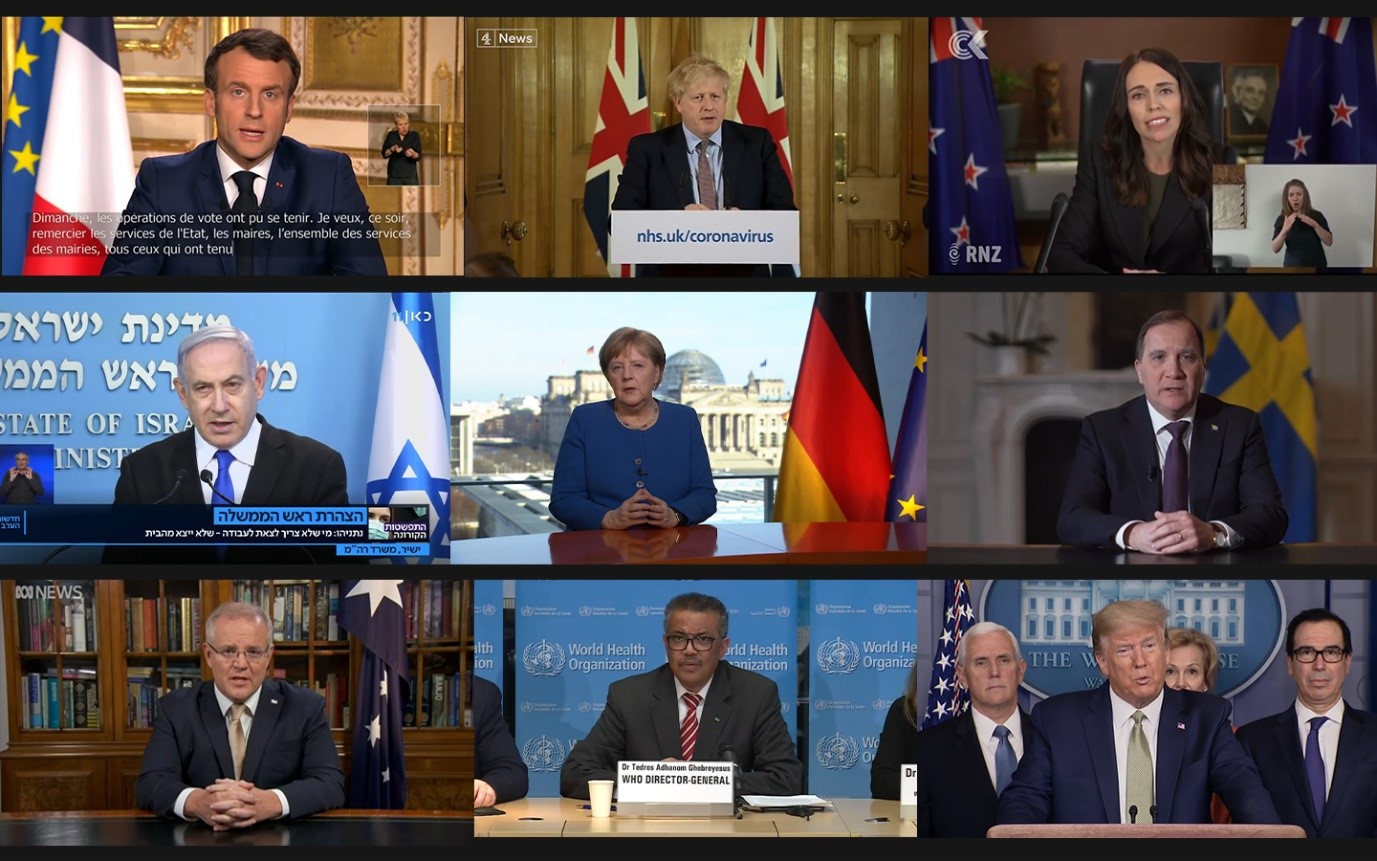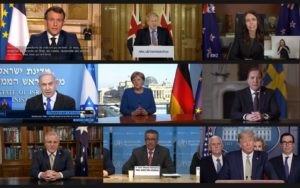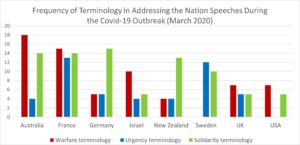
How was the Covid-19 pandemic communicated by different leaders in their televised speeches and why does it matter?
by Hadas Emma Kedar

In a small-scale analysis I compared the leaders’ speeches of Australia, France, Germany, Israel, New Zealand, Sweden, UK and USA from the early Corona outbreak days. Although almost all leaders chose, for example, to use the term fight (the virus), each presented a very different style of leadership and approach in handling the pandemic. So, I collected all the recurrent terms and divided them into three types: (1) “Warfare” – presenting the pandemic as a war and/or relating to the citizens as soldiers, using terms such as war, fight, front and enforcement; (2) “Urgency” – presenting the emergency, using rationale and moderate terms such as risk, crisis and danger; and (3) “Solidarity” – requesting the participation, understanding and empathy of the citizens, using terms such as solidarity, help and un/certainty.
According to this classification, the frequency analysis shows that Australia, France and Israel used the most “warfare” terms [Graph 1]. At the same time, after Germany, Australia and France also used the most “solidarity” terms. France and Sweden presented the highest use of “urgency” terms, while the USA seem not to have used any. Outstandingly, Sweden did not include any “warfare” terms.
While most leaders used the term fight, UK prime minister Johnson used the perhaps more determined term beat (the virus), implying that the fight must be won. Yet, opposed to the other leaders, Johnson used a wide-ranging terminology and did not repeat many expressions. Australian PM Morrison, in his extensive warfare terminology, used the term fronts to describe the crisis’ complexity. Also, although Morrison frequently used solidarity terms, in one speech he used the rather militant term enforcement (of guidelines) ten times in various conjugations. Finally, US-president Trump used his warfare terminology more radically by referring to Covid-19 as an invisible enemy and a war which the US will win.
An even more apparent speech of war was held by French president Macron, who used the phrase we are at war six times during his speech. Albeit his diplomatic tone, Macron’s phrase stood out together with inferring the citizens and care-workers as soldiers. Interestingly, although warfare terminology was lower in Israel, PM Netanyahu addressed the nation in an “officer-to-squad” style. He obtained a semi-military, semi-pedagogic style, uttering for example: “It’s clear to me that there’s a problem of internalization; it’s not a child’s play, it’s life or death.”

In contrast, Germany’s chancellor Merkel approached the citizens in a mature tone. Her singular use of the term war came to describe the magnitude of the emergency— “since the Second World War”. Of all countries in this sample, Merkel used the most solidarity terms, actually including the word solidarity. New Zealand’s PM Ardern is the second most frequent user of solidarity terminology, often using the term change to describe the changing reality, alongside expressing her understanding of the challenging uncertainty in such times. Finally, Sweden is one of the very few countries which did not impose a lock-down strategy. In his speech, PM Löfven chose mostly the term crisis to describe the situation. I classified crisis as an “urgency” term because it portrays the situation straightforwardly, implying the public’s anticipated behavior. While stating somewhat patriotically how strong the Swedish society is, Löfven also emphasized the importance of solidarity.
I assert that leaders’ speeches should be scrutinized, particularly in times of a crisis, as they potentially set the direction of public discussion—mediated via the mass media. When addressing the nation on a major emergency, the words become the public’s spirit and cognition—thus, potentially, the public’s behavior. A warfare terminology would potentially result in a combative behavior, while a mature and responsible terminology would potentially convey social collaboration. Also, I am quite certain that a solidarity approach of a leader—whether liked or not—would undoubtedly lead to public responsibility and mutual support.
Yet, further questions arise here. For example, is there a correlation between the leader’s speech and his/her policymaking? Did the media in these countries echo the leader’s terminologies, or vice-versa? Can we say that countries with less “war” and more “solidarity” expressions achieved better results (e.g. less infection cases, less deaths and/or less economic disruption)? And above all, looking at crises such as those deriving from climate change, have leaderships developed better crisis-management skills?
Certainly, this pandemic can be an opportunity to learn how to improve the public-media-leadership communication in times of crisis.
Sources
| Country | Date of speech | PM / president | Duration (ap.) |
| Australia | 26.03.2020 | Scott Morrison | 16:00 min. |
| France | 16.03.2020 | Emmanuel Macron | 20:30 min. |
| Germany | 18.03.2020 | Angela Merkel | 12:40 min. |
| Israel | 17.03.2020 | Benjamin Netanyahu | 07:00 min* |
| New Zealand | 21.03.2020 | Jacinda Ardern | 08:30 min. |
| Sweden | 22.03.2020 | Stefan Löfven | 05:20 min. |
| UK | 23.03.2020 | Boris Johnson | 06:15 min. |
| USA | 17.03.2020 | Donald Trump | 07:40 min.* |
*an opening statement, as part of a longer press conference including other state officials